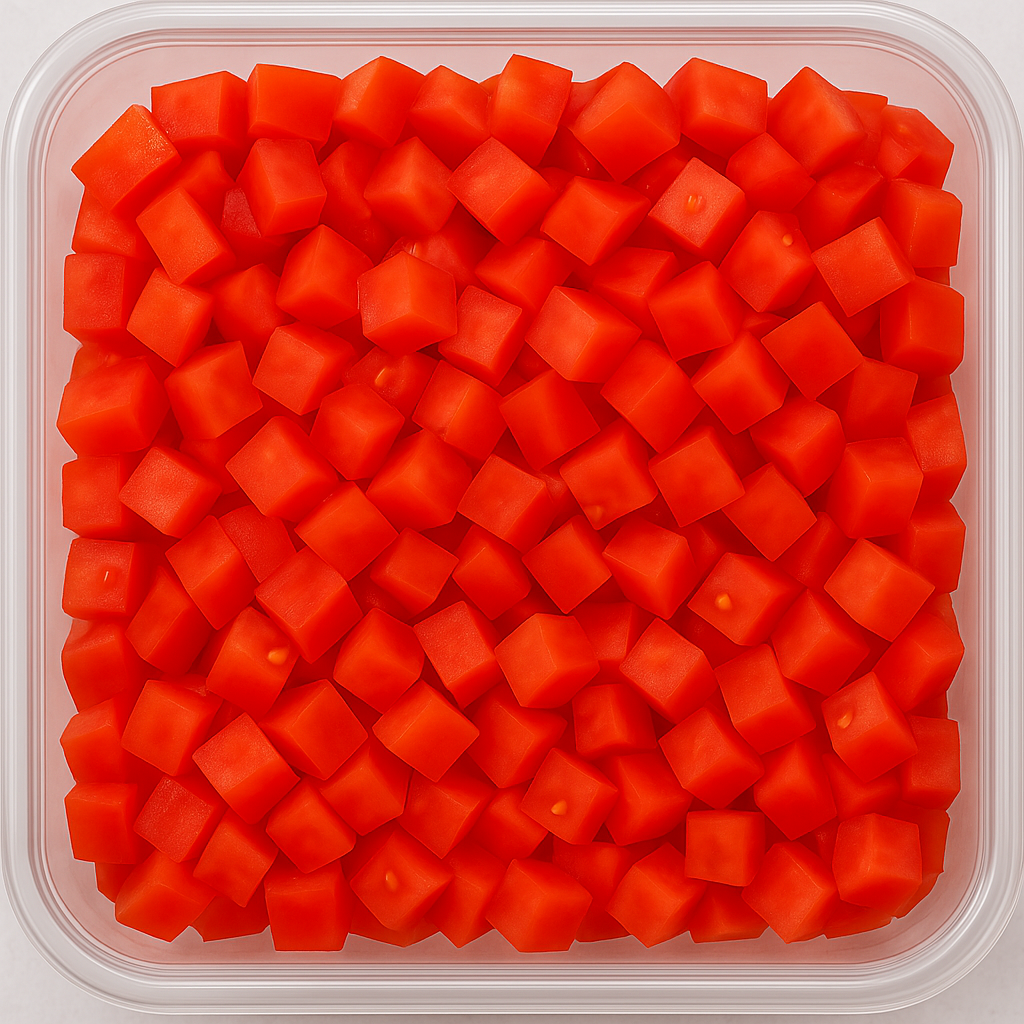Tomatoes are a kitchen staple, adding flavor, color, and nutrition to countless recipes. When summer yields an abundant harvest or you find a good deal at the market, freezing diced tomatoes is a practical way to preserve their freshness and minimize waste.
This article walks you through the entire process of freezing diced tomatoes — from selection and preparation to storage and future use.
Why Freeze Diced Tomatoes?
Table of Contents

Freezing diced tomatoes allows you to:
- Preserve ripe tomatoes before they spoil
- Avoid waste when you have a surplus
- Save time in meal prep by having pre-diced tomatoes ready to go
- Enjoy the flavor of in-season tomatoes year-round
- While frozen tomatoes lose their firm texture (so they aren’t ideal for fresh salads), they’re perfect for soups, stews, sauces, casseroles, and other cooked dishes.
What You’ll Need
- Fresh, ripe tomatoes (Roma, beefsteak, or plum tomatoes work well)
- A sharp knife
- Cutting board
- Boiling water (optional, for peeling)
- Ice bath (optional)
- Slotted spoon
- Freezer-safe containers or resealable plastic bags
- Marker for labeling
How to Freeze Diced Tomatoes at Home
Freezing diced tomatoes is a simple process that helps you lock in their flavor and extend their shelf life for use in your favorite cooked dishes. Here’s how to do it step by step:
Choose the Right Tomatoes

Select firm, ripe tomatoes free of blemishes or mold. Roma and plum tomatoes are ideal because they have less water content and fewer seeds, but any tomato variety can be frozen.
Wash and Peel

Rinse tomatoes under cool running water to remove any dirt or pesticides.
Tomato skins can become tough and papery when frozen. For smoother sauces and better texture, peel your tomatoes:
Score a small “X” on the bottom of each tomato.
Blanch in boiling water for 30–60 seconds until the skins start to curl.
Transfer immediately to an ice bath to cool.
Peel off the skins using your fingers or a paring knife.
Dice the Tomatoes

Cut the tomatoes into uniform pieces. The size of the dice depends on your preference or intended use. Discard any tough cores. You can include the seeds and juice unless you want a firmer, thicker product.
Remove Excess Liquid
If you want a thicker product with less water, place the diced tomatoes in a colander and allow excess juice to drain. This step is especially helpful if you plan to use the tomatoes for sauces or chili.
Portion and Pack
You can freeze tomatoes in either small portions or large batches depending on how you plan to use them.
Packaging Options:
Freezer-safe resealable bags: Squeeze out air, lay flat, and stack.
Plastic containers: Leave about an inch of headspace to allow for expansion.
Ice cube trays: Great for small portions — once frozen, transfer cubes to a bag.
Label and Freeze

Clearly label each container or bag with:
The contents (e.g., “Diced Tomatoes”)
The date of freezing
Optional: Quantity or volume (e.g., “1 cup”)
Place in the freezer at 0°F (-18°C) or lower. Tomatoes can be stored for up to 8–12 months for best quality, though they are safe to eat beyond that if kept consistently frozen.
How to Use Frozen Diced Tomatoes

No need to thaw before cooking! Simply add the frozen tomatoes directly into your recipe. If you need to thaw them, place them in the refrigerator for several hours or defrost in the microwave.
Ideal uses include:
Tips and Tricks
Freeze in portion sizes that match your common recipes (e.g., ½ cup, 1 cup, or 2 cups).
If you’re frequently using tomatoes in recipes, batch-dice and freeze over the weekend to save time.
Add herbs or garlic before freezing if you frequently use the same seasoning profile.
Final Thoughts
Freezing diced tomatoes is a smart and simple way to preserve the essence of summer and keep your kitchen stocked with a key cooking ingredient.
Whether you grow your own tomatoes or buy them fresh, having a stash of frozen diced tomatoes can make meal prep more convenient while reducing food waste. Follow the steps above, and you’ll always have delicious tomatoes at your fingertips — no can opener required.
Leave a Reply